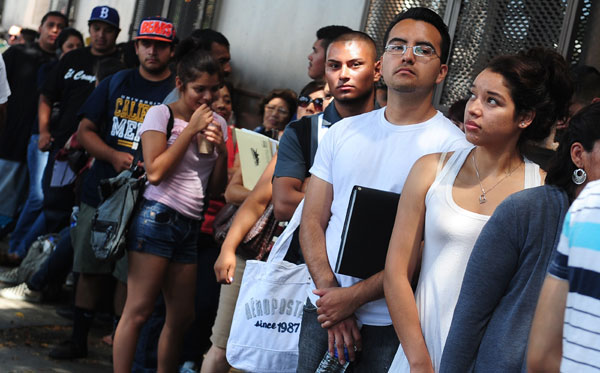Paperless immigrants dare to dream
Updated: 2012-08-17 08:17
(China Daily)
|
|||||||||||
Millions may be granted legal status in US
Marlon Morraz, 19, an undocumented immigrant from Nicaragua, wasted no time in signing up for temporary legal status in the United States under the Obama administration's relaxed deportation rules that took effect on Wednesday.
 |
|
Young people wait in line to enter the office of The Coalition for Humane Immigrant Rights of Los Angeles on Wednesday, the first day of the Deferred Action for Childhood Arrivals program. Frederic J. Brown / Agence France-Presse |
"Now is my chance," he said after picking up an application form at an immigration workshop hosted by a Miami congressman. "I'm pretty elated. Now I have a future."
Morraz, who has been living under the radar since he came to the country when he was 11, is among hundreds of thousands of undocumented immigrants expected to file applications with the Department of Homeland Security under the new rules.
The "deferred action for childhood arrivals" permits shield them from deportation for at least two years as long as they were younger than 16 when they came to the US, have lived in the country since June 15, 2007, and have not been convicted of a felony. They must be at least 15 years of age and no older than 30 when they apply.
Lines of eager, young undocumented students formed outside immigration offices in states with big immigrant populations, such as California and Texas on Wednesday.
At the Coalition for Humane Immigrant Rights of Los Angeles, more than 1,000 young illegal immigrants flooded the group's offices and a church in the same building that opened its doors to take applications and conduct workshops on the program.
As many as 1.7 million people could qualify for the temporary program, which enables them to apply for work permits, social security cards and driver's licenses, according to the Pew Hispanic Center.
US President Barack Obama, whose administration has aggressively deported illegal immigrants with criminal backgrounds, announced in June that he was moving to help this group of youths - many of them Hispanic - who have become increasingly vocal in calling for help.
Many Republicans blasted the move as the Democratic president's grab for Hispanic votes ahead of the Nov 6 presidential election, with an eye on battleground states such as Florida, Nevada and Colorado with big Latino populations.
Morraz, who graduated from high school last year with advanced credits, had to turn down university opportunities at Boston College and the University of Chicago, because his lack of status made him ineligible for financial assistance.
"I started to stop caring about education. I thought it was a waste of time. It just fills your head with dreams for nothing," he said.
A path
Now he has enrolled at a community college to study international relations, and has revived his university dreams with hopes one day of becoming a diplomat.
"Now I have a future. I'm on a path," he said.
The federal policy change has been warmly received by Latino leaders, but has been derided by some Republicans as "backdoor amnesty".
Arizona's Republican governor, Jan Brewer, whose state has been at the center of the national immigration debate, issued an executive order on Wednesday denying public benefits in her state to immigrants who might qualify for temporary legal status under the relaxed federal rules.
Immigration advocates are not entirely satisfied either, calling the policy just a partial implementation of the Dream Act, a bill stalled in the US Congress that seeks to create a permanent legal status for the undocumented children of immigrants who entered the country illegally.
"It's like a Band-Aid," said Daniela Pelaez, 18, a Colombian-born student who came to Miami at age 4. "It's only temporary and we don't know what happens in two years time."
"All these children have the ability to be great Americans. The only question is whether we give them that opportunity," said US Representative David Rivera, a Florida Republican who hosted Wednesday's workshop to advise applicants for the program.
"I'm not so concerned about the mechanics of how this was done," he added, referring to criticism of president Obama's executive order, "as much as I am about it's being a foundation for a permanent solution".
Reuters
Related Stories
New immigrants don't deserve the hardships they face 2012-08-11 06:10
Obama attacks Romney on immigration 2012-06-23 08:07
Asians now largest group of new US immigrants 2012-06-21 16:18
Obama spares many young illegal immigrants deportation 2012-06-18 15:54
Obama shifts US immigration policy 2012-06-16 21:33
Today's Top News
President Xi confident in recovery from quake
H7N9 update: 104 cases, 21 deaths
Telecom workers restore links
Coal mine blast kills 18 in Jilin
Intl scholarship puts China on the map
More bird flu patients discharged
Gold loses sheen, but still a safe bet
US 'turns blind eye to human rights'
Hot Topics
Lunar probe , China growth forecasts, Emission rules get tougher, China seen through 'colored lens', International board,
Editor's Picks

|

|

|

|

|

|





